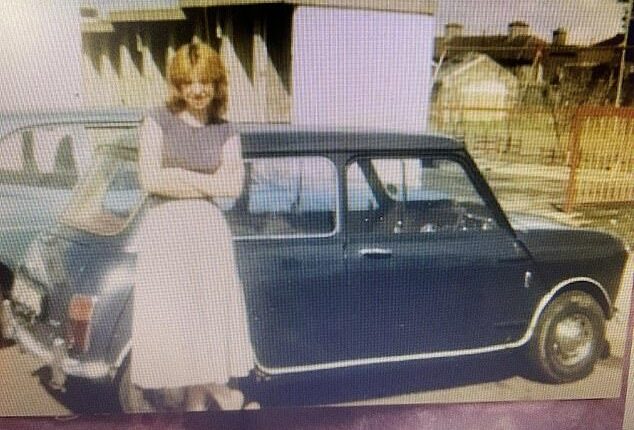When teenage Kathleen Richards arrived at the door of 25 Cromwell Street, she thought she had found a haven.
It was Autumn 1977, and, aged just 17, Kathleen was grateful to Fred West, a well-known local handyman, for offering her a home.
‘When Fred opened the door, he was friendly and smiley. More than anything, he seemed normal and ordinary, which I appreciated,’ she shared
‘My older sister and I had both had to leave our home because there was no space. She had a baby, and we had nowhere else to go. Fred was offering rooms to rent at a reasonable price, and we thought we’d struck lucky.
‘The irony chokes me, even now.’
The first warning bell sounded moments after arrival – but Kathleen admitted she initially brushed concerns off, thinking Fred was just ‘a dirty old man’, whose behaviour she said was much more accepted in the 1970s.
Now 65 and a mother of three, Kathleen, from Gloucestershire, has recounted her escape from the chilling exploits of the dwelling exclusively to the Daily Mail – later dubbed ‘House of Horrors’ – and how one victim’s tragic fate left her heartbroken.
At first, she explained, the lodging set-up seemed harmless, and even cosy.

When teenage Kathleen Richards arrived at the door of 25 Cromwell Street, she thought she had found a haven. It was Autumn 1977, and, aged just 17, Kathleen was grateful to Fred West, a well-known local handyman, for offering her a home. Pictured in the 70s, aged 18
‘He took us into a living room crammed with people. I was from a big family, with nine siblings, so it made me feel at home,’ she shared.
‘Fred introduced his wife as Rosemary, and she didn’t smile at all, didn’t say anything in welcome. Then he pointed to a girl around my age, and said: “This is my lover, Shirley”.’
Remarking on the jarring statement, Kathleen said she initially ‘thought it was a joke’ and even ‘felt embarrassed for him when nobody laughed’.
‘Fred was around the same age as my dad,’ she continued. ‘There was no way Shirley was his girlfriend – especially when he already had a wife in the same room.’
Upstairs, in the bedroom, Kathleen found a series of holes in the wall – yet another discovery she believed to be innocuous.
‘Me and my sister giggled over it, wondering if they were spy holes, but we didn’t really believe it,’ she added.
‘We were just teenagers and very naïve. We filled the holes with balls of old newspaper. But the next morning, the newspaper was on the floor. We just pushed them back in and thought someone was having a joke with us.
‘The room itself was fine; a double bed, wardrobe, drawers and a chair. There was a sink too and a window overlooking the back garden. It was basic but we had more space than we’d ever been used to, so we liked it.’

It was Autumn 1977, and, aged just 17, Kathleen was grateful to Fred West, a well-known local handyman, for offering her a home. The Wests pictured
Kathleen settled in well at Cromwell Street and eventually befriended Shirley – the girl who she had met earlier, in the Wests’ living room. Soon, she had learned Shirley was having Fred’s baby.
‘I just didn’t believe it,’ Kathleen expressed. ‘I couldn’t fathom it. Fred was easily twice her age. Shirley was quiet and shy and didn’t say much and I always got the feeling there was something she wasn’t telling me.
‘We often walked to the local shop together. She had cravings for ice-lollies. Another time, she bought me a pasty. One day, I gave her some bangles I’d bought off the market. But she said: “I don’t know if Fred will like that.” I didn’t understand it.’
Fred, meanwhile, quickly became a nuisance – with things escalating from ‘rude suggestions’ to more physical advances.
‘He’d rub himself up against me in the hallway. Outside my room, he slapped my behind and groped me,’ Kathleen recalled.
‘I told him to leave me alone and tried to avoid him, but he’d pop up, as though he was waiting to ambush me.
‘I just thought he was a dirty old man; in the 1970’s, people accepted behaviour like that more easily. Besides, he was an adult, and he was my landlord. I was too frightened to take a stand against him.’
It wasn’t long however, before Fred’s behaviour became sinister.

Now 65 and a mother of three, Kathleen, Gloucestershire, has recounted her escape from the chilling exploits of the dwelling – later dubbed ‘House of Horrors’ – and how one victim’s tragic fate left her heartbroken. Pictured today
‘He had me pinned up against the wall in the hallway one day and I was screaming,’ she said.
‘Shirley came out and said: “Let her go, Fred” and he just walked away. I was so grateful, and amazed that he just did as she said.’
Kathleen described another instance where he ‘forced his way into her bedroom and pinned her down on the bed’.
‘I was yelling,’ she shared. ‘I remember the smell of him more than anything, it turned my stomach.
‘I had suffered with seizures since I was a child, and more than once, his attacks brought on a seizure where I fell unconscious and I had no idea what had happened to me in that time.
‘My sister had a boyfriend in Derby, so she and her baby were away most weekends, and I was on my own there.
‘I once came home and Fred had let himself into my bedroom and he was waiting for me. He’d say: “Let’s have some fun” as though it was all a big joke. He’d laugh all the time, and I questioned whether I was making a fuss over nothing. He certainly didn’t seem to take it seriously.’
Kathleen admitted that she wanted to report him, but didn’t have the confidence.

Upstairs, in the bedroom, Kathleen found a series of holes in the wall – yet another discovery she believed to be innocuous. Pictured aged 18

At first, she explained, the lodging set-up seemed harmless, and even cosy. Kathleen pictured as a teenager
‘Fred was well-known locally as a builder and DIY handyman,’ she explained. ‘I’d seen him leave his evening meal half-eaten to give some young people a lift into town once. He was forever doing errands and favours. I thought nobody would believe me if I spoke out against him.
‘I was just a kid. I’d been raised in poverty in Dublin and I’d been sexually abused as a child. My own perception of what was normal was very skewed because of my trauma. I had such low self-worth that I really didn’t think anyone would ever listen to me, or whether I even had a valid complaint.
‘I had nowhere else to go; no money and nobody to help me. I just thought I had to put up with it.’
But Rose then became involved in the attacks.
‘I had always been more afraid of Rose. She wasn’t jokey or easy-going like Fred. I’d hear her screaming at her kids. She had a way of looking at me, from under her eyelids, as though she thought she was better than me,’ she recounted.
‘Sometimes, she spoke in a very breathy voice, like a little girl. Other times, she’d bawl and swear. She was like two different people, and it was unnerving.’
Kathleen remembered several occasions when the couple joined forces against her – including once, when she was waiting outside the house to meet a friend.
‘Both Fred and Rose came out and took an arm each,’ she said. ‘They were literally dragging me back into the house, and I was yelling at them to let me go.

In May 1978, Kathleen noticed Shirley (pictured) hadn’t been around for a few days. She asked around but could find no information

More searches uncovered more bodies. Nine young women, including Heather West, were buried at the property, in the garden, and in the cellar which had been turned into a sick sex dungeon. Pictured, a policeman on duty outside the house

She later met her husband, Mike Richards (both pictured), and they have a daughter, Hannah. For many years they were foster parents, supporting vulnerable children
‘Someone walked past and I think that put them off, and I managed to wriggle free. I actually went to the police station but when I got to the doors, I didn’t have the confidence to go inside.
‘Another day, Rose invited me into her living room, and she was wearing a see-through nightie and watching an explicit film. I fled. I was appalled.’
In May 1978, Kathleen noticed Shirley hadn’t been around for a few days. She asked around but could find no information.
‘I plucked up courage to approach Fred and he said: “Gone to Germany” very casually, as though it was of no interest,’ she continued.
‘I was stunned. She was heavily pregnant, I didn’t see how she could just up and leave. I was a little hurt as well. I’d thought we were friends, and she hadn’t even said goodbye.
‘My sister and I had been saving a bag of baby clothes for Shirley’s baby. I hoped she might come back so we could give them to her.’
That summer, Fred was also busy with a DIY project – and Kathleen remembered hearing him working in his cellar until late at night. From her bedroom window, she spotted him digging holes in the back garden.
‘I thought he was a DIY fanatic, like my dad,’ she remarked. ‘When I saw him in the garden, I joked he was digging a swimming pool. Little could I have known that he was burying poor Shirley, right under my window.’
A year and a half after moving in, the sisters arranged to go out for the day, but Kathleen woke with a migraine.
She hoped that sleeping it off would help – but when she woke, there were hands under her nightclothes and Fred was in her bed.
Kathleen had ‘smelled him before she saw him’, adding: ‘He said he wanted me to watch a video with him and Rose. I knew only too well what kind of video he was talking about. I thought they were going to rape me.’
Realising she needed a way to get out, the young woman asked for five minutes in the bathroom – and promised to meet him downstairs.
‘As soon as I heard him go, I fled, wearing my pyjamas and in my bare feet,’ she said. ‘I ran all the way to the bus station, to wait for my sister’s bus. There was no way I could go back there.’
Kathleen went to live with an older brother but never spoke of her time at Cromwell Street – having grown up ‘learning to keep quiet about abuse’.
However, she often thought of Shirley and wondered how she was – hoping she was safe.
Kathleen went on to have two children. A single mother, she worked in factories, care homes and pubs to support her family.
Early one evening in February 1994, she was preparing a meal when she heard a radio report announcing Fred and Rose West had been arrested on suspicion of multiple murders.
The news left her ‘shellshocked’.
‘I knew Fred and Rose were predatory but could never have dreamed they were killers. My first thought was for Shirley, I prayed she wasn’t a victim,’ she said.
Kathleen learned that police had been investigating the disappearance of the Wests’ missing daughter, Heather, 16, which had triggered a search for more bodies.
The story quickly became global and days later, Shirley’s body was found at Cromwell Street. She had been eight months pregnant.
‘I was heartbroken,’ Kathleen admitted. ‘I thought back to that final attack from Fred. I could so easily have been his next victim if I hadn’t run away.
‘Mostly, I felt guilt. If only I had spoken up – stood up to Fred or gone to the police – I felt I could and should have saved Shirley. I felt responsible. I blamed myself, even though it wasn’t rational or fair. I couldn’t see that.’
More searches uncovered more bodies. Nine young women, including Heather West, were buried at the property, in the garden, and in the cellar which had been turned into a sick sex dungeon.
Two more bodies were found in fields nearby including Fred’s ex-wife, Catherine Costello. Catherine’s daughter, Chramaine, was discovered buried in a house where Fred and Rose used to live.
Fred West confessed to at least 12 murders and apparently claimed he had killed many more. He took his own life on New Year’s Day 1995 whilst on remand. Rose, then 41, appeared at Winchester Crown Court later that year and denied 10 counts of murder.
‘The police found me and asked me to give evidence. I was petrified; I really thought I would be in trouble for not speaking up about what Fred and Rose did to me,’ Kathleen said.
‘I agreed to confirm one fact in court – that Fred had told me Shirley was his lover – but that was all. I could not bear to say anything else, my trauma was too raw.’
Her evidence helped to convict Rose to a life sentence but she felt no comfort – admitting it was hard not to ‘blame herself’.
‘I tried to distance myself from everything at Cromwell Street,’ Kathleen continued. ‘I had severe anxiety and depression.’
She later met her husband, Mike Richards, and they have a daughter, Hannah. For many years they were foster parents, supporting vulnerable children.
Almost 50 years on, Kathleen has written a book: ‘Under their Roof’ which tells her story.
‘I’m finally learning that I should feel no shame or guilt,’ she admitted.
‘What happened to Shirley and all those other poor girls was not my responsibility.
‘I understand my trauma prevented me from speaking to the police or the court. I realise how lucky I am to have escaped the clutches of Fred and Rose West.
‘It’s taken a lot of courage but I’m using my voice to tell my story, for the sake of those poor girls who were so cruelly silenced.’









